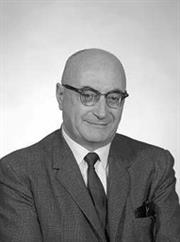Joseph Katz

Short Biography & Significant Contribution
Joseph Katz had been a great contributor to comparative education, but not just through scholarly works. He is most well known for his development of international contacts and organizations for the promotion of Comparative Education (Wilson, 1994).
Professor Katz received a Ph.D. from the University of Chicago. After working briefly at the University of Manitoba, he began a long career at the University of British Columbia (UBC), where he initiated a comparative program in 1956 (Wilson, 1994).
Katz served as president of the Comparative Education Society (CES) in 1961-1962 (Brickman, 1966) and was instrumental in writing a constitution for the Comparative Education Society in Europe (McDade,1982). A day before the 1967 CES conference in Chicago, C.Arnold Anderson scheduled a half day at the University of Chicago for presentations on Canada organized by a Canadian group. Afterwards there was a discussion on whether to have a Canadian group organize as a chapter of the Comparative Education Society or become an independent entity. Eventually the Canadian group formed their own Comparative and International Education Society of Canada (CIESC), with Katz as its first president.
Katz had argued in favor of adding the word "international" in the CES name to reflect the organization's global stance. In 1964, a heated debate occurred between Katz and C.Arnold Anderson over the issue (Wilson, 1994). Eventually the name was changed, with twenty-four CES members voting in favor of the name change and fourteen opposed, thus becoming known as the Comparative and International Education Society (Swing, 2007).
WCCES
Katz is credited as being one of the founders of World Council of Comparative Education Societies (WCCES) (Wilson, 1994). In 1968 he had convened an international Committee of Comparative Educationalists in Ottawa Canada, a meeting that became the first World Congress of Comparative Education Societies.. As Katz stated, "We meet in short, to help people everywhere through education to substitute the civilized minds of men for the uncivilized instincts of nature." (quoted in Masemann & Epstein, 2007). In the preface to the Proceedings of the first World Congress of Comparative Education Societies, he wrote that "The Congress itself is evidence that people will work together to achieve not only common but uncommon goals" (Masemenn & Epstein, 2007).
Katz envisioned the Council's development as having three stages: the Congress (1961), the Conception (1965), and the Council (1971-1974). The Congress stage was to bring all comparative education groups together . The conception stage was to plan the formation of the World Council. Finally, the commitment stage was to be the period in which the Council grew in numbers (Masemann and Epstein, 2007).
Educational Background
Ph.D., University of Chicago
Professional Background
Professor of Comparative Education at the University of British Columbia in 1956
Affiliations (associations, organizations, institutions)
Comparative and International Education Society of Canada (Provisional Chairman and then President in 1967
World Council of Comparative Education Societies (President 1970-1974)
Selected Publications
Katz, J. (1962). "Comparative Education and External Aid Programs in Canada." Comparative Education Review (6)1: 12-15.
Katz, J. (1965). "Canada and the International Cooperation Year in Education." Comparative Education Review (1)2: 79-88.
Katz, J. (1966). "Bilingualism and Biculturalism in Canada." Comparative Education (2)2: 113-118.
Katz, J. (1969). Society, Schools and Progress in Canada. Oxford: Pergamon Press LTD.
Katz, J. (1974). Education in Canada. Connecticut: Archon Books.
Created: 6/19/2008
Updated: 6/19/2008
Contributed By: Chaitut Roungchai, Loyola University Chicago
